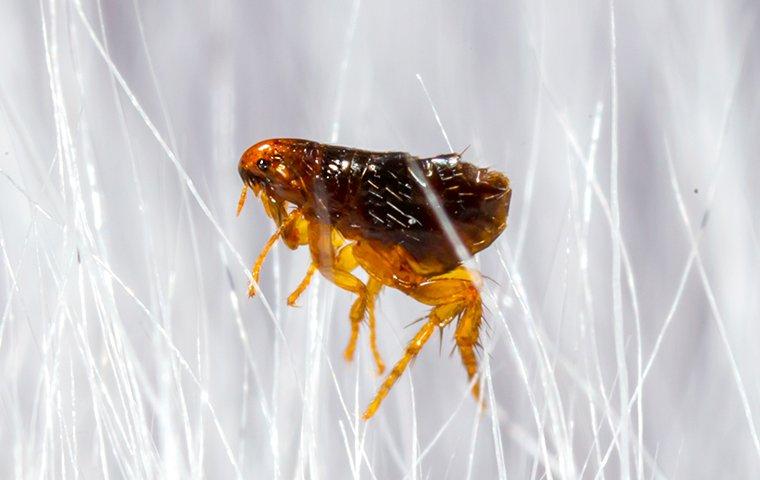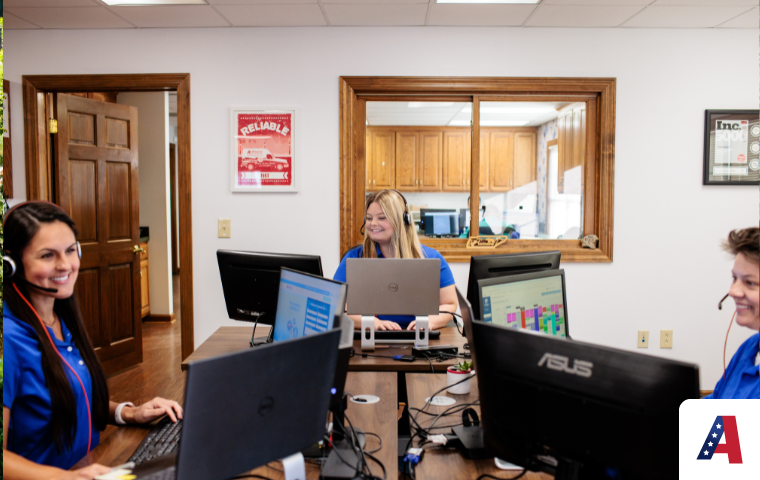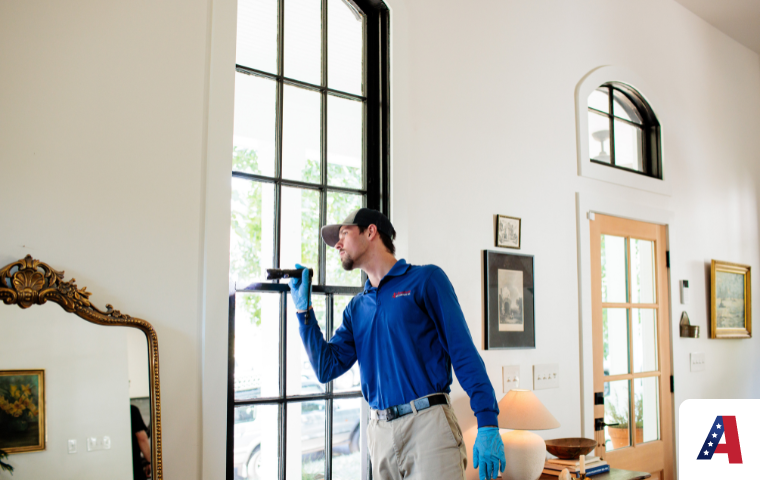Are flea problems making you scratch your head—and your ankles? Well, we have some tips today that will help you win the battle against fleas. Let's take a look at how fleas find their way indoors and what they do once they get into your home. Then, we'll apply that information to flea prevention and control.
We have lots of surprises and twists and turns in this one, but before we get started, we want to quickly remind you that your All-American Pest Control service team is always ready to help. We know a bit about flea control in Nashville. We've been doing it for quite a while. You're never alone when battling fleas. Connect with us any time for a flea treatment. With that said, let's jump right in.

The Flea Life Cycle: Understanding Their Stages
Have you ever wondered, "Where do fleas come from?" If so, you're not alone. Sure, most Nashville residents know, and we're sure you know, that dogs and cats bring fleas in from outdoors. But there are some misconceptions about how pets get fleas in the yard. Let's start with the biggest one. Fleas don't hop their way into your yard. While they have an impressive spring, they don't get around by jumping. A flea wants to find a host animal. That's where we'll start.
Stage 1: A flea waits in its cocoon. It can stay cocooned for a very long time. When it senses an animal nearby, it breaks free, springs through the air, and clings to the hair of the animal. That is where it will stay. It is rare for a flea to change addresses, so to speak.
Stage 2: The adult flea bites the animal host and draws blood for nourishment. It will also look for other fleas on the animal and mate. During this process, females produce eggs. These eggs are smooth and can fall off the animal as it travels or beds down.
Stage 3: Baby fleas are somewhat of a mystery to most people. Sometimes, people see two sizes of fleas and think the small ones are babies, but baby fleas aren't insects. They're little wiggly worms. And, in their larval stage, fleas can't bite. They feed on the droppings, or flea dirt, of adult fleas. When the eggs hatch where flea dirt is present, it makes it possible for fleas to grow.
Stage 4: Flea larvae develop and eventually cocoon themselves. In their cocoons, they pass through the pupal stage and become adults. That leads us back to stage one of the process.
What can you learn from understanding the stages of the flea life cycle?
First, the fleas that break free from their cocoons are looking for a host animal. They'll hop onto any warm-blooded animal. The animals then proceed to bring fleas into your yard as they pass through. If an animal beds down in your landscaping or under your deck, they can create the conditions for flea development. All that is required is for eggs and flea dirt to fall off in the same location. When the larvae hatch, those wiggly worms find the flea dirt and develop until they can cocoon themselves in again.
There are two ways to stop fleas from developing. You can take steps to prevent animals from leaving eggs and flea dirt in your yard or get routine treatments to disrupt the development process.
The Hidden Dangers Of Fleas: Understanding The Hazards
When fleas find their way into your home, they can take root and increase their population. All they need is food. Unfortunately, they have to bite to survive. Their bites can cause discomfort to you, your kids, and your pets. But there are some hidden dangers to consider as well.
An infected flea can spread murine typhus, tungiasis, bartonellosis, or tularemia. Fortunately, most of the fleas in a home are newly hatched and have not come in contact with an infected animal. Fleas also tend to stay on one host, as we noted earlier. So, the risk of disease transmission is dependent on various factors.
When considering the impact of flea-borne diseases, it is critical to understand that a flea does have to bite you to make you sick. Illness can spread when flea dirt gets into an open wound, or your cat gets sick and you have exposure to infected saliva.
A flea can also pick up tapeworms and spread them to your dog or cat. Tapeworms have the potential to become a serious concern for dogs and cats but are rarely a threat to humans. The human body is better equipped to purge these parasites.
As the flea population grows and the bites are more numerous, it is possible to end up with a condition called anemia. Check out medical resources for a description of this illness.
Mostly, fleas are a nuisance, and their presence in your home will cause discomfort. As long as you learn about the potential hazards listed above and watch for symptoms, you don't need to worry. Now, let's look at steps you can take to keep fleas from getting into your home in the first place.
Flea Prevention Goes Beyond Just Your Pets: Tips And Tricks
We're sure you know that flea prevention starts with your dog or cat. Speaking to your veterinarian about what flea control products are best for your pets and your family is essential. Your vet may suggest collars, powders, topical treatments, medication, and more. There are also methods for preventing your dog or cat from bringing these pests into your house.
- Do routine checks of your pets and look for flea dirt or adult fleas. Watch to see if your pet starts to scratch. If you see flea dirt, adult fleas, or your pet is scratching, take steps to stop fleas quickly. Wash all pet bedding. Wash blankets that your dog or cat sleeps on. Vacuum your floor regularly. A quick response can prevent fleas from taking root in your home.
- On top of pet grooming and flea control for your dog or cat, there are things you can do in your yard to reduce fleas. As you can probably guess, these tips revolve around managing wildlife. Here's where to start:
- Check your yard for common food sources that attract animals, such as seeds, nuts, fruits, and berries. Addressing these food sources can deter animals.
- Rake leaves and get rid of them. Removing leaves can reduce animal activity because many animals eat bugs. Some animals use leaves to form a bed. They can create a flea habitat if they bed down near your home.
- Protect your trash. Animals can get a bite to eat in your trash. Raccoons are the worst. They open lids, tear garbage bags apart, and set the lids right back down. Use something heavy to prevent them from doing this, and they'll stop tracking fleas into your yard as they come to dine on your leftovers.
- Block access to voids. Animals can dig under your shed, deck, stairs, and other structures. Use chicken wire, hardware cloth, or some other material to keep them out. You can also make these voids unappealing by removing stored items and opening these spaces up.
- If you have a dog and do not have a fenced-in recreation area, we recommend building one. A fence keeps your dog(s) contained so they can't explore other areas of your property where fleas are waiting. It can also help keep wildlife out.
These and other similar steps can make it less likely that animals will deposit fleas in your yard for your dog or cat to pick up. When you also take actions, like cleaning your gutters and fixing plumbing issues, to keep your perimeter dry, you may succeed in keeping fleas at bay.
Total Flea Elimination: Call The Pros Right Away!
Fleas can find a way into your yard and onto your pet no matter what you do. While the tips mentioned above will reduce the chances, there is still a chance. So, what do you do when fleas try to take over your home? Why not call the professionals? Your All-American Pest Control service team can make short work of those fleas.
At All-American Pest Control, we use Integrated Pest Management techniques (the gold standard in home pest control) to strategically eliminate the fleas in your home and break the infestation cycle. But you don't have to wait until you have fleas in your Nashville home. We can help you keep these parasitic insects away long before they have a chance to get inside with a flea treatment for your yard.
All-American Pest Control offers Pest Control Yard Treatments to address ticks, chiggers, fire ants, and fleas! These routine treatments break the cycle of development in your yard. When fleas can't grow into adults and jump onto your dog or cat, you won't have your pets tracking fleas into your home.
Want to learn more about flea control in your Nashville home or Pest Control Yard Treatments to keep fleas out? Call, text, or drop us a line on our Contact Us page. We're here to answer your questions, offer guidance, and get you the help you need. Connect with us today.
We're Ready To Help
Call Our Office or Complete the Form To Get Your Customized Quote
 1450 Reviews
1450 Reviews




